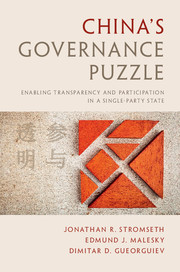Book contents
- China’s Governance Puzzle
- China’s Governance Puzzle
- Copyright page
- Dedication
- Contents
- Figures
- Tables
- Preface
- Abbreviations
- 1 China’s Approach to Governance Reform
- 2 Concept, Chronology, and Drivers of Transparency Reform
- 3 Transparency and Corruption: Analysis of Variation Within China and Hypothesis Testing
- 4 Comparing Approaches to Combating Corruption: The Guangdong and Chongqing Models
- 5 Concept, Chronology, and Drivers of Participation Reform
- 6 Participation and Compliance: Analysis of Variation and Hypothesis Testing
- 7 Making Policy in Public: A Comparison of Three Chinese Provinces
- 8 The Road Ahead
- Select Bibliography
- Index
7 - Making Policy in Public: A Comparison of Three Chinese Provinces
Published online by Cambridge University Press: 23 March 2017
- China’s Governance Puzzle
- China’s Governance Puzzle
- Copyright page
- Dedication
- Contents
- Figures
- Tables
- Preface
- Abbreviations
- 1 China’s Approach to Governance Reform
- 2 Concept, Chronology, and Drivers of Transparency Reform
- 3 Transparency and Corruption: Analysis of Variation Within China and Hypothesis Testing
- 4 Comparing Approaches to Combating Corruption: The Guangdong and Chongqing Models
- 5 Concept, Chronology, and Drivers of Participation Reform
- 6 Participation and Compliance: Analysis of Variation and Hypothesis Testing
- 7 Making Policy in Public: A Comparison of Three Chinese Provinces
- 8 The Road Ahead
- Select Bibliography
- Index
Summary
The final chapter on public decision-making extends our empirical inquiry into China’s consultative decision-making process by addressing selection biases and mapping causal mechanisms. By comparing three provinces, each with varying capacity and resources for dealing with policy challenges, we clarify the conditions under which Chinese policymakers rely on public consultation as well as the conditions under which consultation contributes to more effective policy choices. Looking closely at Sichuan, Jiangsu, and Chongqing we find that public participation is tool of necessity, not convenience. That is, policymakers turn to consultation when faced with the sort of policy challenges for which traditional top-down authority is ill-equipped to deal with. For example, policymakers in both Sichuan and Jiangsu experimented with consultation to resolve labor and environmental policy challenges resulting from mass privatization and disasters, both natural and man-made. By contrast, Chongqing’s municipal authorities relied on large public expenditures and propaganda to win over public opinion.
Information
- Type
- Chapter
- Information
- China's Governance PuzzleEnabling Transparency and Participation in a Single-Party State, pp. 243 - 275Publisher: Cambridge University PressPrint publication year: 2017
